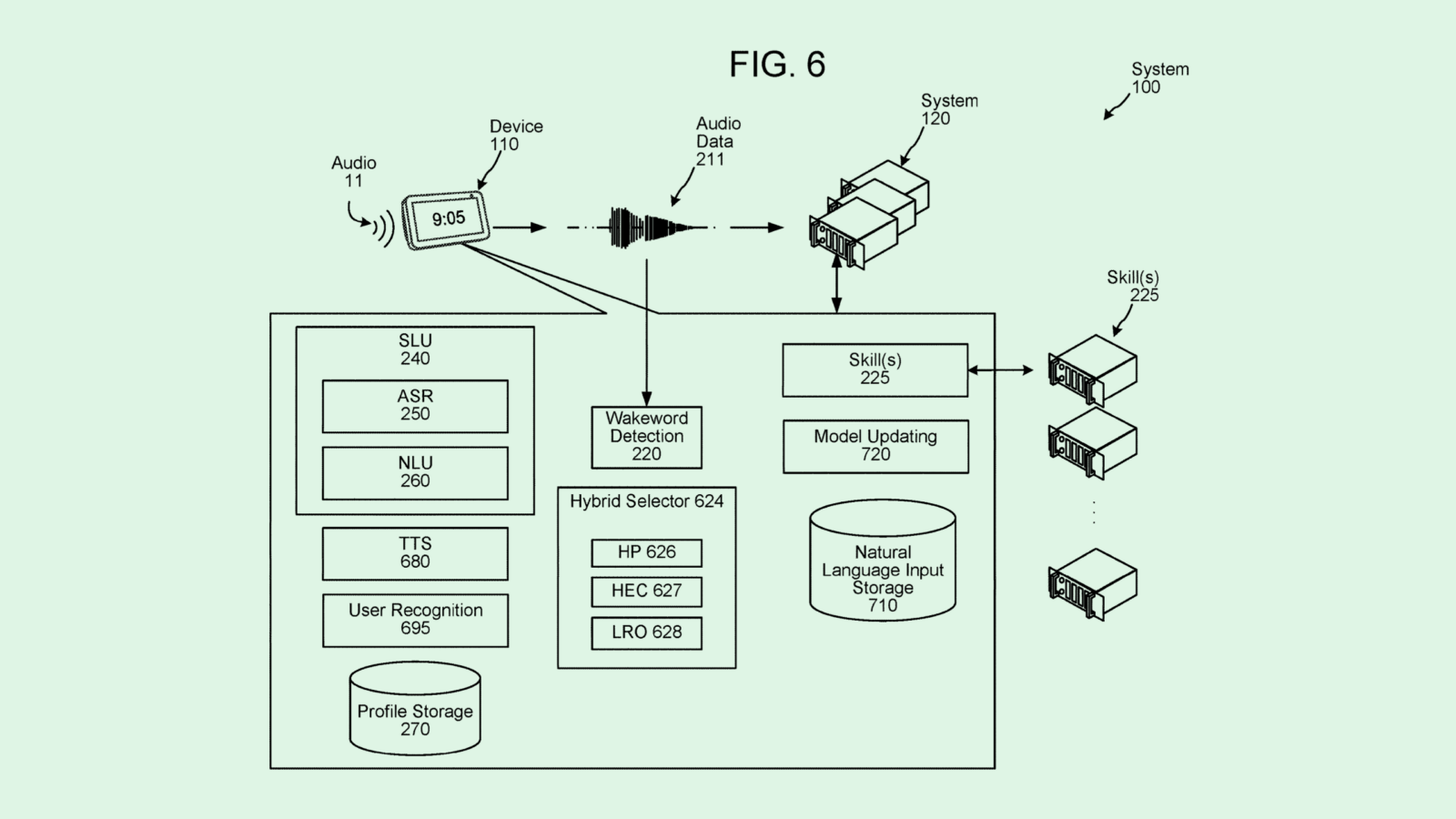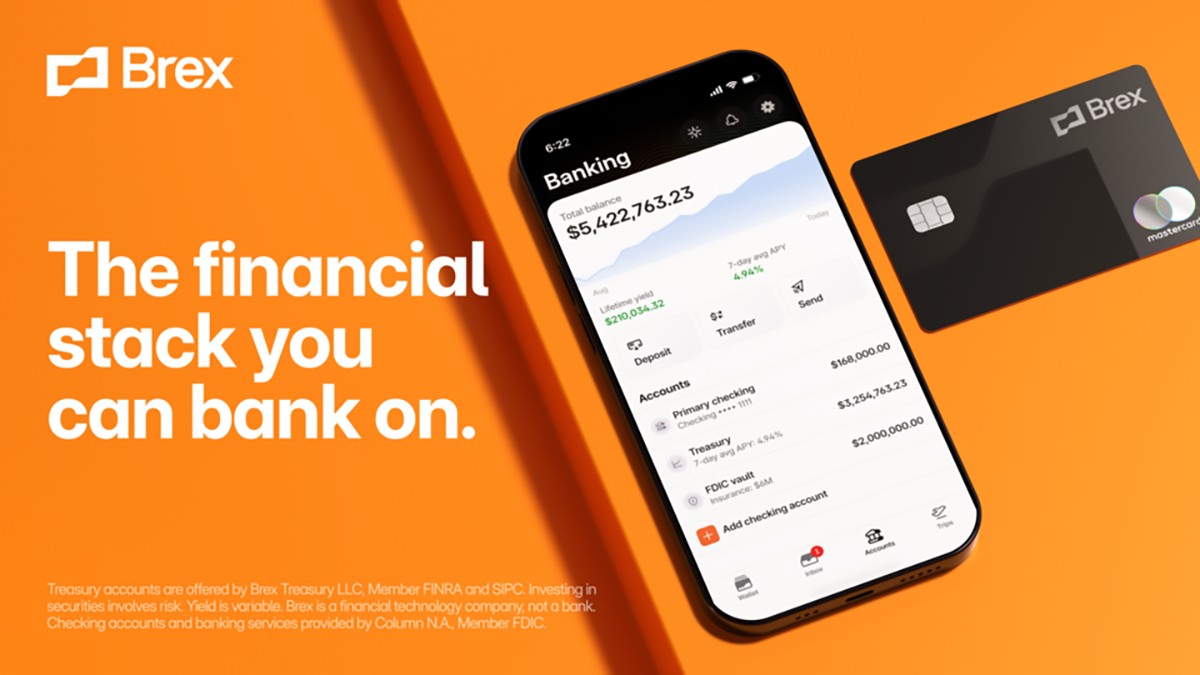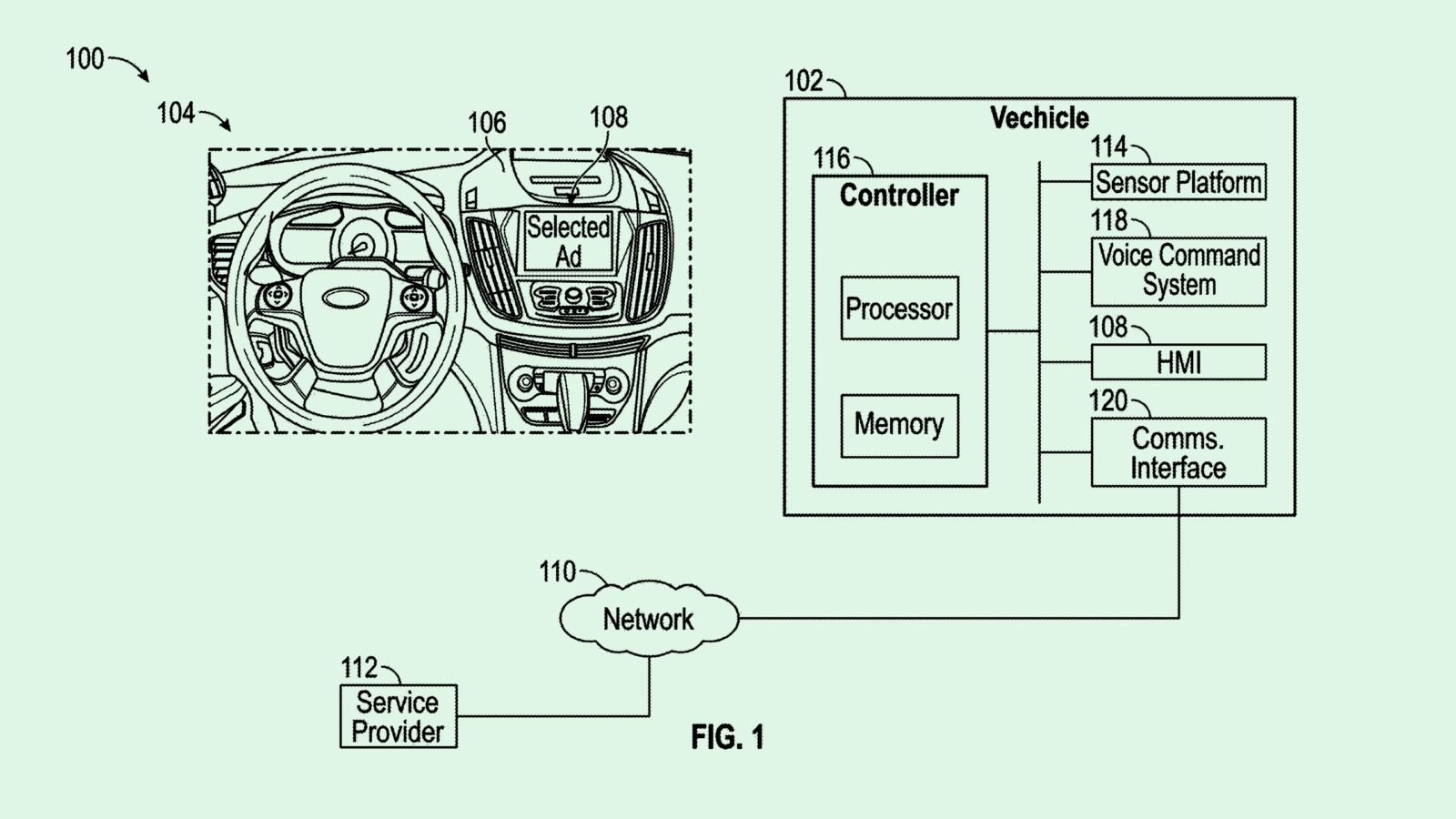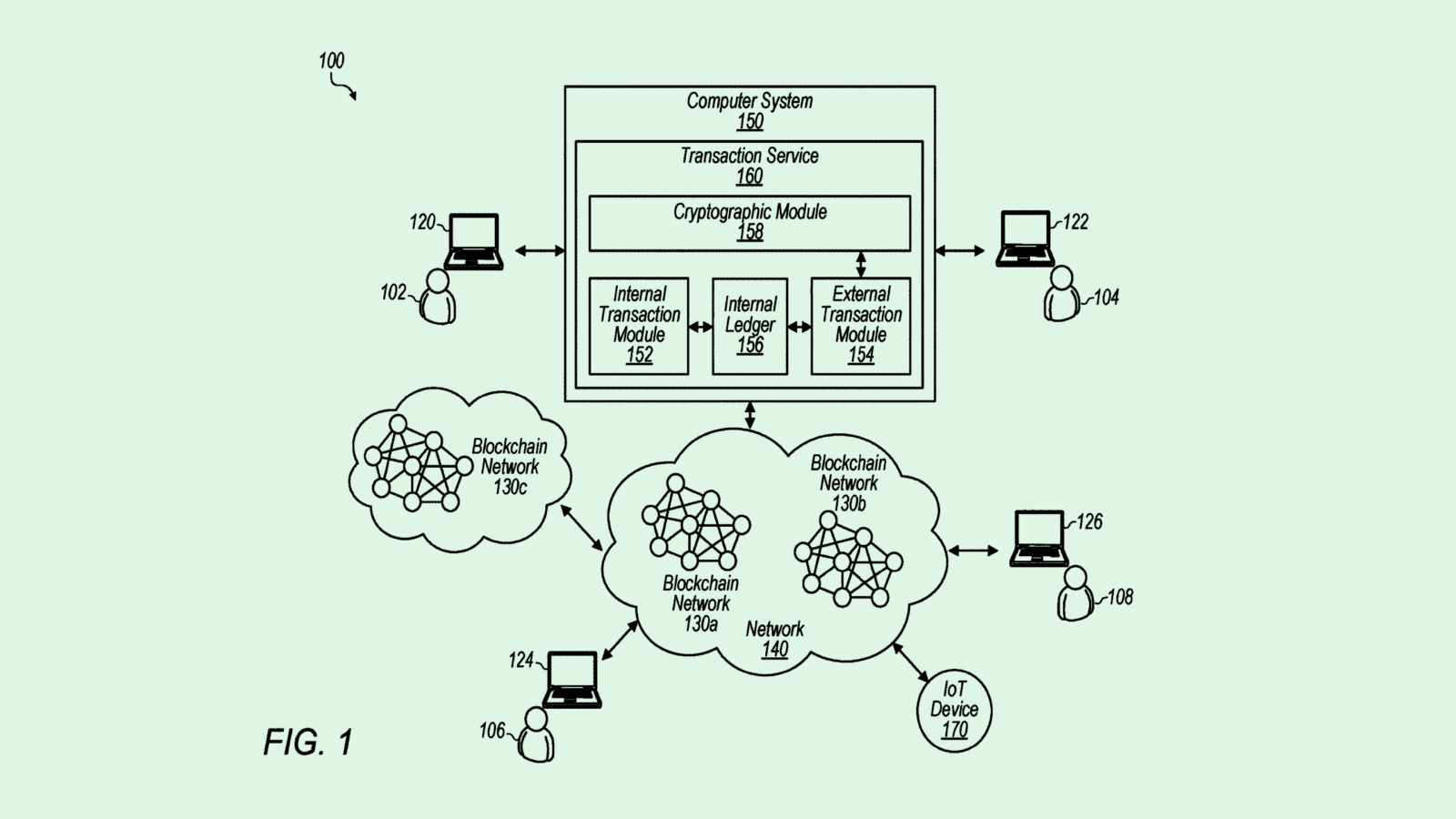Happy Monday and welcome to Patent Drop!
Today, a recent Amazon patent may seek to make Alexa smarter and more personalized — but it could have the opposite effect. Plus: a Ford patent may bring personalized ads on your next road trip, and PayPal tests when not to use blockchain.
Before we jump into today’s patents, a word from our sponsor, Brex. Any successful startup founder knows that runway is everything. Stretching each dollar is crucial, which is why 1 in 3 US startups use Brex. With Brex you get the best of checking, treasury, and FDIC protection in one account — learn more about Brex’s banking solutions.
Let’s take a peek.
The Alexa Domino Effect
Amazon wants Alexa to have an open mind.
The tech giant filed a patent application for “machine learning model updating” corresponding to language and gesture input. Amazon’s tech essentially aims to help speech recognition modes better understand and adapt to a user’s behavior over time.
When Amazon’s model first receives a new user input, whether it be a voice command or a gesture, this system categorizes that input based on how it could be used to train the device, depending on whether or not the data needs to be labeled.
Once the input is categorized, the system proceeds with training the model, whether it be a speech, gesture, or facial recognition model, based on its training type. These updates occur automatically and continuously, so whenever new data is available, the model is instantly training and gets better over time.
After updating the model, the system may delete the data used to train it to preserve user privacy. If the data is kept for further training, it’s de-identified.
By updating this model continuously, this tech can understand a user’s habits, patterns, and trends. For example, if a user frequently requests the device play a certain song, it can more easily recognize that input for future requests.
This method “combine[s] automation and continual updating of machine learning models to enable increased user privacy while also providing a better user experience and [reducing] developer workload.”

Amazon had high hopes for giving Alexa an AI-powered upgrade, announcing a generative AI revamp to the voice assistant last September and internally dubbing the project “Remarkable Alexa.” But a Fortune report from June found that Amazon has struggled to bring that vision to life: The project’s faced both technical and organizational mishaps.
Now, Amazon has reportedly turned to Anthropic (in which it’s invested $4 billion), using its large language model Claude to power the next generation of Alexa devices, Reuters reported in late August. An Amazon spokesperson told Reuters that the company will use “many different technologies to power Alexa,” including its own and those from partners.
Though the tech in this patent aims to make speech recognition devices sharper, more conversational, and more personalized, a system like this may have the opposite effect, said Bob Rogers, Ph.D., the co-founder of BeeKeeperAI and CEO of Oii.ai. To put it simply, training a model to be personalized bit by bit with small pieces of data could create a domino effect that impacts the way it was originally trained, he said.
“If you don’t have a way to make sure that your updates don’t break the old stuff, your [model’s] behavior is going to get weird,” Rogers said.
This patent’s focus on privacy may also be a hindrance, said Rogers. Deleting the data right after it’s used for training creates an “instability risk” in which the model can drift from the original point of reference, unchecked.
On the other side, holding on to that data creates a “honey pot,” he said. “It’s almost a security problem. How do you store that data without risking it, so that you may maintain that memory?”
The question remains: Is a smarter version of Alexa worth it? Though having a device that can understand you and your context on a deeper level could achieve Amazon’s goal of creating the “world’s best personal assistant,” actually getting there clearly isn’t an easy feat, he said. “I’d rather have a dumb product that works really well than a smart product that only kind of works,” Rogers said.
Extend Your Runway, Scale Your Business

A long runway is crucial for two types of people: pilots and startup founders.
Fortunately, airports tend to have well-maintained runways, but it’s a different story for founders. Why do most banks chip away at their funding with fees, minimums, and delays? Founders deserve better — that’s why Brex built a banking solution that helps startups take every dollar further.
With Brex, you get the best of checking, treasury, and FDIC protection in one account:
- Send and receive money fast worldwide.
- Earn industry-leading yield from your first dollar — while being able to access your funds anytime.
- Protect your cash with up to $6M in FDIC coverage through program banks.
Ready to join the 1 in 3 US startups using Brex and take every dollar further?
Ford’s In-Car Ads
Ford might want to get to know its drivers a little better.
The automaker filed a patent application for “in-vehicle advertisement presentation,” which relies on collecting a host of data on drivers to determine the best ads to feed them.
“Advertisements can be presented through voice or audio systems in the vehicle,” Ford said in the filing. “A user’s preferences for advertisements can also be influenced by driving conditions or other contexts.”
In order to better tailor ads to drivers, Ford’s system would collect information about current conditions, such as location, speed, and traffic; whether or not the vehicle is being driven autonomously; and predictions for route and destination. Additionally, Ford’s system may rely on “historical user data,” such as engagement with previous advertisements, that is “obtained from any one or more of a third-party applications.”
Ford’s tech would then show the user ads via the screen in their car, or employ audio-only ads through speakers. For example, if a driver is on their way to the grocery store, it may advertise deals on certain products. If they’re on a road trip, it may encourage them to stop at a certain gas station.
It may also “intelligently schedule variable durations of ads,” aiming to “maximize company revenue while minimizing the impact on user experience.”

When contacted by Patent Drop, a Ford spokesperson said that it’s patent applications shouldn’t be taken as forecasts for its future plans. However, Ford is no stranger to autonomous vehicle technology.
The company has sought to patent autonomous maintenance and in-vehicle autonomous drones, and Ford CEO Jim Farley told Bloomberg TV in June that its vehicles achieved partial autonomy in testing. Patenting tech like this would fit squarely into that self-driving vision, said Bob Bilbruck, CEO of consulting firm Captjur.
When drivers no longer have to take their hands on the wheel, time spent in vehicles can be occupied in other ways, said Bilbruck. And often, that time may be spent on a screen. “If you’re watching content or something in the car and you don’t have to look at the road, [advertising] is going to be a lot more effective,” he said.
While this could create a lucrative new revenue stream for Ford and other automakers dreaming up autonomous vehicles, it also presents a privacy conundrum, said Bilbruck. This patent — and personalized advertising generally — relies on getting to know peoples’ likes, dislikes, and behaviors.
Bilbruck noted that a lot of this data is already likely in these companies’ hands. “You’ve just got to assume, as a consumer, you have no privacy,” he said. “You’ve already given that data to them. I think it’s going to reach a point where consumers are going to say, ‘No, I don’t want my life tracked,’ but I don’t think there’s going to be a way to really opt out of it.”
PayPal Cuts Its Energy Bill
PayPal wants to grow its blockchain footprint without growing its carbon one.
The company filed a patent for using an “internal ledger with blockchain transactions.” At its core, this tech aims to save power by recording some transactions on a less computationally-intense ledger, rather than throwing everything on the blockchain.
“One problematic aspect of blockchain technology is that transactions on the network may be computationally expensive for both computing nodes on the blockchain, as well as for a requesting computing device that initiated a transaction,” PayPal said in the filing. “These transactions may also have a substantive time delay.”
PayPal’s tech aims to overcome that issue by differentiating between internal transactions, or those that occur between accounts within PayPal’s ecosystem, and external ones, in which assets are transferred out. Instead of recording every digital asset transaction on the blockchain, this system would only record external transactions on the blockchain.
Those staying within PayPal’s ecosystem would rely on a so-called internal ledger for tracking. Accounts within its ecosystem would still have their own cryptographic keys used to perform digital asset transactions outside of the network.
When an account performs a digital asset transaction with an external source, PayPal’s tech consolidates transactions performed internally to synchronize the internal ledger with the blockchain one. By performing fewer, larger transactions instead of several smaller ones, this tech saves computing power “and financial costs associated with the use of such computational resources,” the company said.

PayPal has been pounding the pavement in the cryptocurrency space. The company launched its own stablecoin, called PayPal USD, last August. A year later, the digital currency has exceeded a market cap of $1 billion. The company also recently announced a partnership with Crypto.com that would allow users to link their PayPal wallets with the crypto exchange.
However, blockchain has a reputation for eating up tons of energy. According to the US Energy Information Administration, cryptocurrency mining accounts for between 0.6% to 2.3% of US electricity consumption. Global energy consumption from Bitcoin mining alone doubled in 2023, reaching 141.2 terawatt-hours.
As larger financial institutions and fintechs take an interest in crypto, the tech’s power usage could be a growing consideration. Tech like this could help the company not only save on the costs associated with ramping up blockchain transactions, but help it attain its previously stated goal of reaching net-zero emissions by 2040.
Plus, this isn’t the first time we’ve seen PayPal take an interest in making crypto greener: The company previously filed a patent application for a carbon-neutral blockchain protocol, which relies on “green wallets” to help offset carbon emissions generated by crypto transactions made on its platform.
Extra Drops
- Adobe wants to teach you Photoshop. The company filed a patent application for a way to use machine learning to generate “image editing directions in a latent space.”
- Google wants to write your captions. The company is seeking to patent a system for “generating natural language descriptions of images.”
- Lyft wants to keep its scooters up and running. The company filed a patent application for a “micromobility transit vehicle battery connection and lock system.”
What Else is New?
- Amazon-owned Audible will start creating AI voice replicas of some book narrators. The company invited a select group of narrators to help it train its AI.
- VC firm Atomico, founded by Skype co-founder Niklas Zennström, raised two funds worth $1.24 billion to invest in European tech startups.
- Brex Knows That Runway is Crucial. So they built a banking solution that helps founders take every dollar further. Unlike most traditional banking solutions, Brex has no minimums and gives you access to 20x the standard FDIC protection via program banks. And you can earn industry-leading yield from your first dollar — while being able to access your funds anytime. Get Brex, the business account used by 1 in 3 US startups – learn more.*
* Partner
Patent Drop is written by Nat Rubio-Licht. You can find them on Twitter @natrubio__.
Patent Drop is a publication of The Daily Upside. For any questions or comments, feel free to contact us at patentdrop@thedailyupside.com.

